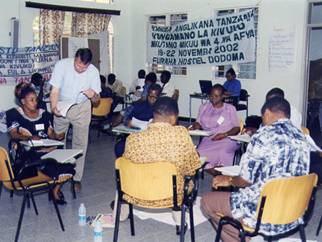|
|
HIV/AIDS Alliance Puzzles Elderly Persons
By Arusha Times Correspondent, Arusha Times
United Republic of Tanzania
December 18, 2005

An Arusha elder has said many people of his age in the area ignorant on some key information regarding the killer HIV/Aids.
Stephen Kitomari, who is the chairman of the retired public servants in Arusha, known by its acronym as CHAWAMA, says many elders in the region do not know the difference between Aids and HIV.
He said although many residents know that full-blown Aids and HIV, the virus that causes it, is sexually transmitted, they are not aware if they are two different ailments or two sides of the same coin.
"Many old people don't know the difference between HIV and Aids. They only know that they are transmitted through sex" he said in an interview last week.
He emphasized that elders in Arusha, and elsewhere in the country, need to be sensitized enough and made conversant on key information on HIV/Aids so that they could take corrective measures to halt its spread.
He added that elder people not only need to know important information on the pandemic, but must also be told the difference between Aids and HIV "so that such information can assist them as peer educators".
Mr. Kitomari said although elder people, including retirees like himself, can educate the peer groups on measures to check the spread of HIV/Aids, their services have not been fully utilized.
A workshop on HIV/Aids held in Arusha last week was told that some people suffering from full-blown Aids as well as HIV carriers were not receiving adequate care and support from their respective families.
"HIV/Aids awareness should involve all stakeholders be government, non-governmental organisations, community-based organisations and others. That way we can tackle the issue of Aids properly" he suggested.
Mr. Kitomari warned on people taking Aids drugs without appropriate diagnosis by qualified doctors, saying it was dangerous and risky to their lives. He urged Aids patients to consult doctors everytime they need medical assistance.
He suggested that the elders in Arusha and elsewhere in the country should be empowered on HIV/Aids matters because they are the ones who take care of the victims including the sick, orphans and other dependants and offered support to affected families.
"Our organisation (CHAWAMA) is made up of retired people but people are still committed to serve the community better in areas such as anti-Aids programmes. We are very sympathetic to HIV/Aids victims" the association's chairman said.
No statistics on Aids prevalence in and around Arusha was given during the workshop. However, it was agreed that peer groups should act as agents of behavioural change in the society through, among other things, dissemination of right information.
|
|



